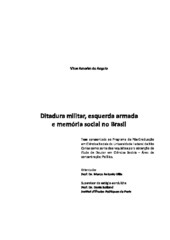| dc.contributor.author | Angelo, Vitor Amorim de | |
| dc.date.accessioned | 2016-06-02T19:24:47Z | |
| dc.date.available | 2011-12-05 | |
| dc.date.available | 2016-06-02T19:24:47Z | |
| dc.date.issued | 2011-05-18 | |
| dc.identifier.citation | ANGELO, Vitor Amorim de. Ditadura militar, esquerda armada e memória social no Brasil. 2011. 225 f. Tese (Doutorado em Ciências Humanas) - Universidade Federal de São Carlos, São Carlos, 2011. | por |
| dc.identifier.uri | https://repositorio.ufscar.br/handle/ufscar/1420 | |
| dc.description.abstract | The thesis discusses the relationship between the Brazilian s military dictatorship and the armed left in the years 1960-70 and its effects on the social memory about that period. The preparation of the 1964 coup and the structuring of the military regime are often attributed to the National Security Doctrine (DSN), which would have be the rational basis of the action and the thought of the Brazilian military. From this point of view, build an efficient information-repressive apparatus would result by the DSN s guidelines. However, as the thesis demonstrates, the armed left never represented a real threat to the dictatorship. Using precisely the guerrillas as a justification for the intensification of the regime, part of the Armed Forces tried to impose on other military trends. Later, when the social memory about the military period began to be built, the armed left appeared as responsible for the end of the dictatorship, when we know that the regime was the one who gained strength in the combating of guerrillas. The establishment, consolidation and reproduction of this and other myths about the old left armed occurred during the amnesty mobilization, in the late of the 1970 s, and the Diretas Já!, in the next decade, when the former guerrillas have been in contact with several sectors society that opposed the dictatorship and fought for the return of democracy. | eng |
| dc.description.sponsorship | Universidade Federal de Sao Carlos | |
| dc.format | application/pdf | por |
| dc.language | por | por |
| dc.publisher | Universidade Federal de São Carlos | por |
| dc.rights | Acesso Aberto | por |
| dc.subject | Brasil - política e governo | por |
| dc.subject | Democracia | por |
| dc.subject | Brasil - transição política | por |
| dc.subject | Partidos e organizações políticas | por |
| dc.subject | Revolução | por |
| dc.subject | Guerrilhas | por |
| dc.subject | Ditadura | por |
| dc.subject | Esquerda | por |
| dc.subject | Luta armada | por |
| dc.subject | Memória social | por |
| dc.subject | Military dictatorship | eng |
| dc.subject | Left | eng |
| dc.subject | Armed struggle | eng |
| dc.subject | Social memory | eng |
| dc.subject | Revolution | eng |
| dc.subject | Democracy | eng |
| dc.title | Ditadura militar, esquerda armada e memória social no Brasil | por |
| dc.type | Tese | por |
| dc.contributor.advisor1 | Villa, Marco Antonio | |
| dc.contributor.advisor1Lattes | http://genos.cnpq.br:12010/dwlattes/owa/prc_imp_cv_int?f_cod=K4787708U0 | por |
| dc.description.resumo | A tese discute a relação entre a ditadura militar e a esquerda armada brasileira nos anos 1960- 70 e seus reflexos na memória social a respeito daquele período. A preparação do golpe de 1964 e a estruturação do regime militar freqüentemente são atribuídas à Doutrina de Segurança Nacional (DSN), que teria fundamentado racionalmente a ação e o pensamento dos militares brasileiros. Desse ponto de vista, a montagem de um eficiente aparato informativorepressivo seria resultante das diretrizes da DSN. Porém, como o trabalho demonstra, a esquerda armada jamais representou uma ameaça concreta à ditadura. Usando precisamente a guerrilha como justificativa para o recrudescimento do regime, parte das Forças Armadas buscou se impor sobre as demais tendências militares. Mais tarde, quando a memória social acerca do período militar começou a ser construída, a esquerda armada apareceu como uma das responsáveis pelo fim da ditadura, quando se sabe que o regime foi quem se fortaleceu no combate à guerrilha. A criação, consolidação e reprodução desse e de outros mitos a respeito da antiga esquerda armada ocorreu durante a mobilização pela anistia, no final dos anos 1970, e nas Diretas Já!, na década seguinte, quando ex-guerrilheiros estiveram em contato com amplos setores da sociedade que se opunham à ditadura e lutavam pela volta da democracia. | por |
| dc.publisher.country | BR | por |
| dc.publisher.initials | UFSCar | por |
| dc.publisher.program | Programa de Pós-Graduação em Ciências Sociais - PPGCSo | por |
| dc.subject.cnpq | CIENCIAS HUMANAS::SOCIOLOGIA | por |
| dc.contributor.authorlattes | http://lattes.cnpq.br/4045059477271704 | por |
